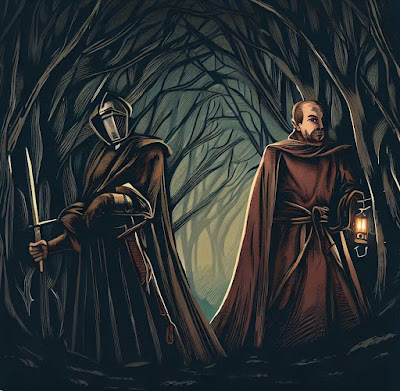To which I replied: "If you’re bulking up the Godorno sections, and Godorno is also the setting for Coils of Hate, maybe there’s the opportunity to combine the two?"
"To make one mega book where the character can both save Godorno from Hate and the forest from the Westermen?" said Stuart. "It isn't beyond the realms of possibility. In Coils of Hate, the character has to flee the city due to the anti-Judain rhetoric. They then wander the surrounding area for a bit then go back. Maybe wandering the surrounding area could turn into a quest to save the forest as well? Then the character comes back? There are similar themes in the sense that human greed and hate are ruining things for everyone."
From that little acorn was to grow the magnificent blockbuster that is Ravages of Hate. You can get the first draft of the book here, and Stuart and Mark plan to run a Kickstarter to fund a print edition with new illustrations -- by real human artists, you'll be glad to hear, not Bing.
There was a third book, which I have mentioned before. I offered to help Mark flowchart that one before he plunged into the writing. I'll admit I had a little bit of an agenda when I made that offer. The publisher had made me fix the flowchart for Coils of Hate, or try to fix it, and I'd had to work on that while a deadline was looming on another book. So I was pretty frazzled after that, and given only two weeks before it went to press I hadn't really been able to make the flowchart work properly anyway. I dreaded having to do the same thing all over again, so thought the best thing would be to help Mark with the flowchart of the next one. At least that way I'd know how the story was meant to fit together, just in case the publisher expected me to clean up that one too.
But Mark couldn't work that way because it didn't fit with his creative process. He always took a novelistic approach to the writing, and having the plot constrained in gameplay terms from the outset would have hampered him too much. I didn't want to spoil that -- I've already said that I think the maturity of Coils of Hate's storyline and the richness of its characters are way ahead of anything I've seen in any other gamebook.So when the publisher asked me, as I feared they would, to evaluate and edit Mark's third Virtual Reality book (titled The Mask of Death) I had to turn it down. I was still a nervous wreck from trying to knock Coils of Hate into shape. The manuscript went to VR series editor Ian Marsh. Had it come to me I would have kept a copy, being an inveterate hoarder, but sadly neither Ian nor Mark did, and now it's lost forever. (Unless, like one of those missing episodes of Doctor Who, it turns out that the publisher still has it in a desk drawer somewhere.)
It's a shame because Stuart could have included all three books in his magnum opus. Still, he's created a 1330-section gamebook as it is, so he deserves a break. Please let him have any playtesting comments (contact details on his blog) and be sure to back the Kickstarter. Maybe if the funding goes well, reconstructing that third book could be a stretch goal.
Completely unrelated to all the above, but as we're on the subject of old gamebooks, some readers of the blog have been asking about the HeroQuest series. The third of those is quite possibly the book I was meant to be writing when I was suddenly given the task of fixing the Coils of Hate flowchart. You can get them here: The Fellowship of Fear (book 1), The Screaming Spectre (book 2), and The Tyrant's Tomb (book 3).




.jpg)










